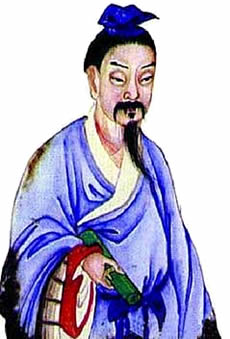 |
| Ban Biao |
Ban Biao, the father, began writing a monumental history titled the Hanshu (Hanshu), Book of Han or History of the Former Han Dynasty.
It was commissioned and produced under court patronage and was the first historical work devoted to a dynasty (the Western Han, 202 b.c.e.–23 c.e.). Although Ban Biao died long before its completion, his essay on sovereignty, which was included in the work, became a basic document on political ideas.
However, most of the 100 chapters (divided into 10 volumes) of this work belonged to his son Ban Gu (Pan Ku, 32–92 c.e.). His younger sister Ban Zhao (Pan Ch’ao, c. 48–116 c.e.) finished the history. She was the outstanding female intellectual in early imperial China.
The classic historical work followed the organizational pattern set by the first great Chinese historian, Sima Qian (Ssu-ma Ch’ien), who wrote the Shiji (Shihchi), or Records of the Historian, but applied to events of a single dynastic period.
Its 100 chapters were organized into separate sections consisting of 12 chapters of basic annals, eight of chronological tables, 10 of treatises, and 70 of biographies and bibliography. Although critics think the prose style of this work is drier and less elegant than Sima Qian’s work, subsequent historians have admired the two and have aspired to follow their examples.
Ban Zhao was educated at home, married, had children, and was widowed young. In addition to completing her father and brother’s unfinished history, she was often summoned to the palace by the emperor to lecture to the empress and ladies of the court. She lectured on classical writings, history, astronomy, and mathematics.
She became adviser to the empress regent and was so influential that the empress fired her own powerful brother on the basis of Ban Zhao’s memorial indicting him. The same empress regent was so saddened by Ban Zhao’s death that she ordered the court into mourning.
Ban Zhao wrote poetry, edited, and added to a first-century c.e. work titled Biographies of Eminent Women and a short book of seven chapters titled Lessons for Women on proper behavior for ladies that was intended for her young daughters but became widely read and circulated during her lifetime and later. She was the first thinker to formulate a complete statement on feminine ethics and the idea of relative ethics.
Significantly, she advocated giving girls an education up to the age of 15 to ensure intellectual compatibility between husbands and wives. After her death her daughter-in-law compiled and published her collected writing, some, including poetry and memorials, have survived.
The fourth member of this distinguished family was Ban Chao (Pan Ch’ao, 32–102 c.e.), who was the twin brother of Ban Gu. A man of action who distinguished himself as a young officer, Ban Chao was a key general who established Chinese supremacy in modern Chinese Turkestan across to Central Asia.
In 92 c.e. he was appointed protector-general of the Western Regions (the Chinese name for Central Asia). As both general and diplomat he supervised affairs and protected Chinese interests in the oasis states and guarded commerce along the Silk Road for three decades.
In 97 c.e. he led an army all the way to the Caspian Sea and sent forward units further west that reached either the Black Sea or the Persian Gulf before turning back. In the same year he also sent an officer under his command to proceed to Da Qin (Ta Ch’in), the Chinese name for the Roman Empire.
But the mission was intercepted in Parthia (modern Iran) and forbidden to proceed further. Parthia lay along the Silk Road between China and Rome and benefited from trade between the two empires. It naturally wanted to thwart any direct relations between China and Rome. As the author of the Hou Hanshu (Hou Han-shu), or History of the Later Han Dynasty, wrote:
“During the Han period, however, Chang Ch’ien ... and Pan Ch’ao ... eventually succeeded in carrying out expansion to the far west and in bringing foreign territories into submission. Overawed by military strength and attracted by wealth, none [of the rulers of the states of the Western Regions presented] strange local products as tribute and his loved sons as hostages ... Therefore ... the command of the protector-general was established to exercise general authority. Those who were submissive from the very beginning received money and official seals as imperial gifts, but those who surrendered later were taken to the capital to receive punishment. Agricultural garrisons were set up in fertile fields and post stations built along the main highways. Messengers and interpreters traveled without cessation, and barbarian merchants and peddlers came to the border for trade everyday.”
After three decades of service in Central Asia, for which he had been elevated to the rank of marquis, the aged general asked to retire and returned to the capital city, Luoyang (Loyang), where he died a month later.
